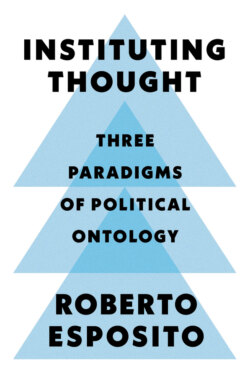Instituting Thought

Реклама. ООО «ЛитРес», ИНН: 7719571260.
Оглавление
Roberto Esposito. Instituting Thought
Contents
Guide
Pages
Instituting Thought. Three Paradigms of Political Ontology
Copyright page
Introduction
Notes
1 Destituting Power
Notes
2 Constituent Power
Notes
3 Instituting Thought
Notes
Index
POLITY END USER LICENSE AGREEMENT
Отрывок из книги
Roberto Esposito
Translated by Mark William Epstein
.....
3. The ontologico-political paradigm whose influence is most strongly felt in Deleuze’s works is antipodal to the post-Heideggerian paradigm. Deleuze himself, while recognizing Heidegger’s philosophical stature, views his own oeuvre as a sort of confutation of the latter’s. While they both share a number of themes, what sharply separates them is the plane, which Deleuze himself defines as one “of immanence,” that is in principle destined to abolish all kinds of ontological difference. Since being is univocal, in other words constituted in the unique form of difference, instead of being separated from an ontic dimension, difference coincides with the becoming of being itself. Without dwelling on the transitions that lead Deleuze to elaborate this plane of immanence, we can state that its effect is the exclusion of the notion of the impolitical itself, a notion that, on the other hand, Heidegger’s political reflections do revolve around. Once the negative presupposition of the political has been suppressed, the latter expands to the point of filling the entire movement of reality. This is what Deleuze argues, at least starting from 1968; and this period is identified, not only by him, as the period in which the realization of the political and the politicization of the real resolve into each other without residue. From this perspective the French philosopher’s work – especially the Anti-Oedipus and A Thousand Plateaus – can be seen as the most intense political ontology of the twentieth century, in other words a work in which the two terms, ontology and politics, experience the highest degree of superposition, one that frontally collides with the irremediable fracture Heidegger opened between them.
This does not mean, however, that the matter is closed. It is in fact precisely this superposition that prevents Deleuze from elaborating an effective political thought, almost as if the three areas of being, politics, and thought could not find any possible articulation within his philosophy. This also helps explain the sharp distinction between a first, more technically philosophical part, essentially devoid of political references, and a later one, which exhibits a strong political orientation but is perhaps not as philosophically rigorous. The impression one receives is that, the more politics is superposed on being, becoming the constitutive cipher of its becoming, the less it is being thought of in its specificity. Once it has been extended to the entire ontogenetic process and is its immediate expression, politics ends up losing its own contours, and in the end confuses them with those of being, in which it inheres. If being is political as such, according to Deleuze’s own explicit declaration, how can a specifically political activity be distinguished within it? What differentiates it from that which it is not? Or from another kind of politics, oriented in the opposite direction? I believe that the reason for this impasse – which has not prevented a motley galaxy of political thinkers, in addition to neo-naturists, post-humanists, and hyper-immanentists, from drawing inspiration from the Deleuzian paradigm for their theses – should be sought in Deleuze’s loss of contact with the category of negation. It is true that his emancipation from the negative – which does constitute the principal explicit objective of his ontology – never happens all at once or completely. One can instead say that his work is indeed troubled by it in all its parts, without ever managing to completely discard it. So he passes, sometimes on the same page, from the mutual implication of difference and negation to the opposition between them, from a conception of difference as a figure that affirms the negative to another, which instead excludes it, and he never opts definitely for one of the two. This is the reason for a tragic vein that runs through an oeuvre that is all too often interpreted in an insufficiently problematic fashion. The fact remains that the greater the influence of Bergson, this staunch proponent of the misleading and therefore non-existent nature of the negative, the more Deleuze abandons the category of the negative. This development, in turn, has entropic effects on the determination of the political, since one cannot ask oneself what politics is, even a certain kind of politics, without simultaneously knowing what it is not. This is the way in which a position that is programmatically hyperpolitical – in the sense that it interprets any event in political terms – is reversed, if not into a depoliticizing outcome, at least into a failed determination of the political: of its subjects and objects, of its ends and means, of its organizational forms and strategies. And this is not due to a default, as in the case of Heidegger, but to an excess of politics – which, being defined as identical to everything that exists, risks becoming something that is not at all defined.
.....